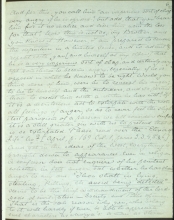Page 11
And for this, you call him "an imperious sort of chap very angry if he is opposed," but add, that you "bear him for it no malice, and like him none the less for that." Now THIS IS NOT SO, my brother, and YOU KNOW IT. However, I am prepared to concede the definition in a limited sense, and to admit and repeat with you (and himself at my elbow) that he is a very imperious sort of chap, and certainly very apt sometimes to become angry, especially if he is opposed in what he knows to be right. Would you think more of him, were he to conceal his anger; to lie to himself and the outsiders, and so permit them to credit him with a virtue he has not? If it is a meritorious act to extirpate with the roots all feelings of anger, so as to never feel the slightest paroxysm of a passion we all consider sinful, it is a still greater sin with us to pretend that it is so extirpated. Please read over the "Elixir of Life" No. 2 (April, p. 169 col. 1, paras. 2, 3, 4, 5, and 6). And yet in the ideas of the West, everything is brought down to appearances even in religion. A confessor does not inquire of his penitent whether he felt anger, but whether he has shown anger to anyone. "Thou shalt in lying, stealing, killing, etc. avoid being detected" — seems to be the chief commandment of the Lord gods of civilization — Society and Public opinion. That is the sole reason why you, who belong to it, will hardly if ever be able to appreciate such characters as Morya's: a man as stern



"Elixir of Life" refers to an article in The Theosophist by Moorad Ali Beg (Godolphin Mitford). Here is the fragment referred to by the Master.